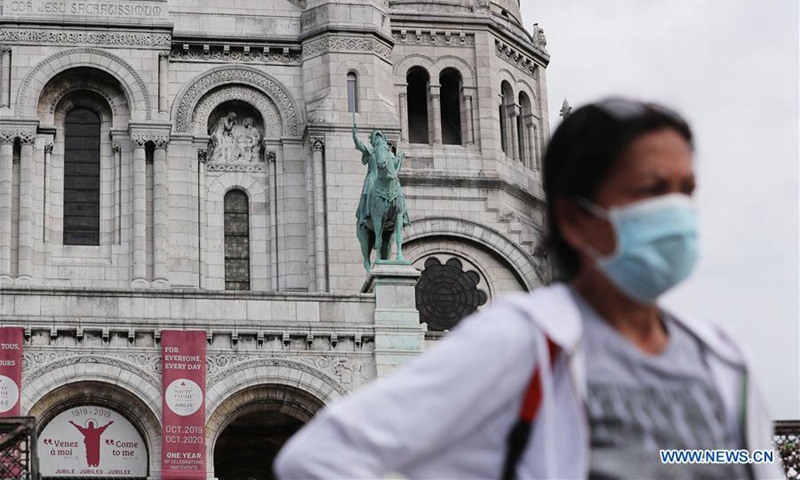


A woman wearing a mask walks in front of the Basilica of the Sacred Heart (Basilique du Sacre-Coeur) at the Montmartre in Paris, France, Aug. 10, 2020. Photo: Xinhua
Global COVID-19 cases reached 20 million on Monday, with more than 730,000 deaths worldwide, according to the Center for Systems Science and Engineering (CSSE) at Johns Hopkins University.
The global case count reached 20,001,019, with a total of 733,897 deaths worldwide as of 2335 GMT, the CSSE data showed.
The bleak number of global infections has doubled in less than two months as the coronavirus pandemic continues to rage across the world.
With 5,085,821 cases and 163,370 fatalities, the United States has suffered the most from the pandemic, accounting for a quarter of the global caseload. Brazil recorded 3,057,470 cases and 101,752 deaths, second only to the United States. India confirmed more than 2.2 million cases.
Some countries in Asia and Europe have seen a second wave of infections arrive, while Africa and Latin America are also trying to slow down the spread of the virus.
Facing the grim milestone, as World Health Organization (WHO) Director-General Tedros Adhanom Ghebreyesus recently urged, world leaders need to "choose the path of cooperation and act now to end this pandemic."
"It's not just the smart choice, it's the right choice and it's the only choice we have," the WHO chief said.

People wearing masks visit the Montmartre in Paris, France, Aug. 10, 2020. Photo: Xinhua
MOMENTUM GROWS
One day before the global milestone, US coronavirus case count crossed the 5-million mark on Sunday, double the number since the end of June, though it boasts the greatest economic strength and one of the most advanced medical systems in the world.
With more than 163,000 COVID-19 deaths, the novel coronavirus has now become the leading cause of death in the United States, killing more people per day than cancer or heart disease, according to a graph published in Newsweek in April. The disease has killed more Americans than the Korean War, Vietnam War, War in Afghanistan and Iraq War combined.
The United States is in a new phase in its fight against the pandemic, Deborah Birx, the White House coronavirus task force coordinator, told CNN earlier this month.
"What we are seeing today is different from March and April. It is extraordinarily widespread. It's into the rural as equal urban areas," she said.
Meanwhile, the pandemic is also grave in other regions around the world. Brazil, the second hardest-hit in the world, has registered more than 3 million confirmed cases and 100,000 deaths on Saturday.
Ricardo Kuchenbecker, a professor of epidemiology at the Federal University of Rio Grande do Sul, said the pandemic in Brazil remains worrying.
"Although there is a decrease in cases and deaths in the north and northeast, they are still occurring at a very high level," the epidemiologist said.
India now is the third country in the world to cross the 2-million mark. At the rate India is growing right now, it seems poised to overtake Brazil in about a month, said a report published in English daily "The Indian Express."
In Africa, COVID-19 cases increased to pass the 1-million mark on Friday, as South Africa alone accounts for around half of the continent's total cases.
Countries with more than 400,000 cases also include Russia, South Africa, Mexico and Peru. Other countries with over 30,000 deaths are Mexico, Britain, India, Italy and France, according to the CSSE.
As lockdown and anti-pandemic restrictions were eased to promote economic and social activity, countries like Germany and France in Europe, Japan and the Philippines in Asia and Iran in the Middle East have seen an uptick in coronavirus infections over the past few weeks.

A taxi driver wearing a mask disinfects his car in Ankara, Turkey, Aug. 10, 2020. Photo: Xinhua
COOPERATION IN NEED
The situation can serve as a sober reminder that the ravaging pandemic is far from withering away, and that the world is in urgent need of global solidarity in combating humandkind's common enemy.
UN Secretary-General Antonio Guterres said last month that only through international cooperation "will we ease the economic and social consequences of the crisis."
"It is only by strengthening bonds across society that we will recover better and build a healthier, more inclusive, sustainable, resilient and equitable world," he said.
While highlighting "the anticipated lengthy duration" of the pandemic, the WHO also said that countries around the world should "share best practices" with the WHO, "apply lessons learned from countries that are successfully re-opening their societies," as well as "support multilateral regional and global organizations and encourage global solidarity in COVID-19 response."
In this context, China has provided emergency medical supplies to more than 150 countries and international organizations since the outbreak, dispatched medical expert teams and shared experts' experiences in combating COVID-19 with multiple countries.
When addressing the opening of the 73rd session of the World Health Assembly via video link in May, Chinese President Xi Jinping announced concrete measures to boost global fight against COVID-19 including providing international aid and making the country's COVID-19 vaccine a global public good when available.
Noting that humankind is facing the most serious global public health emergency since the end of World War II, Xi said "solidarity and cooperation is a sure way through which we, the people of the world, can defeat this novel coronavirus."
He also called on the international community to work as one and make concerted efforts to protect the life and health of people in all countries, safeguard planet Earth and build a global community of health for all.
On the contrary, instead of rallying a global charge to beat the COVID-19 pandemic, Washington has intentionally disrupted efforts to combat the virus, including those of its allies, and hindered international coordination to stem the pandemic's spread by withdrawing from the WHO.
Ghebreyesus, in response, hopes the United States will "reconsider its position" on the decision to withdraw from the organization, noting last week that the COVID-19 pandemic cannot be defeated in a divided world.
"Now it's time to work together," he said, "it's time to focus on fighting the virus."

 Award-winning photos show poverty reduction achievements in NE China's Jilin province
Award-winning photos show poverty reduction achievements in NE China's Jilin province People dance to greet advent of New Year in Ameiqituo Town, Guizhou
People dance to greet advent of New Year in Ameiqituo Town, Guizhou Fire brigade in Shanghai holds group wedding
Fire brigade in Shanghai holds group wedding Tourists enjoy ice sculptures in Datan Town, north China
Tourists enjoy ice sculptures in Datan Town, north China Sunset scenery of Dayan Pagoda in Xi'an
Sunset scenery of Dayan Pagoda in Xi'an Tourists have fun at scenic spot in Nanlong Town, NW China
Tourists have fun at scenic spot in Nanlong Town, NW China Harbin attracts tourists by making best use of ice in winter
Harbin attracts tourists by making best use of ice in winter In pics: FIS Alpine Ski Women's World Cup Slalom
In pics: FIS Alpine Ski Women's World Cup Slalom Black-necked cranes rest at reservoir in Lhunzhub County, Lhasa
Black-necked cranes rest at reservoir in Lhunzhub County, Lhasa China's FAST telescope will be available to foreign scientists in April
China's FAST telescope will be available to foreign scientists in April